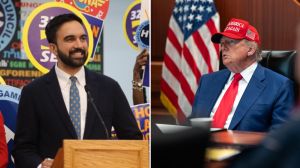The mother of all apologies
Manmohan Singh is rapidly developing the politician's trademark trick of saying many things without saying anything. The latest is the inter...

Manmohan Singh is rapidly developing the politician’s trademark trick of saying many things without saying anything. The latest is the interview in this newspaper in which he spoke of the need to apologise over Babri demolition and Operation Bluestar.
Or did he speak of such a need? He did admit that the mosque demolition was a shameful blot (so what’s new?). But about the Congress apologising for it, his reply was: “If people want to use the word apology, I have no objection.” A profound concession.
Should the Congress apologise for Operation Bluestar? Again, the former Finance Minister was quite clear when he said it was a most unfortunate episode for which “we owe an apology to the nation.” Then the politician added: “If a section is soothed by someone on behalf of the Indian nation expressing regret…”. Pressed whether the Congress should express regret, the former Finance Minister and present Political Minstrel said: “The Congress can express regret without apportioning blame or accepting that it (the Congress) was responsible. Many factors were responsible.” So what exactly did he say? Certainly he didn’t say Yes. And he didn’t say No. The consummate politician never gives a simple answer to a simple question. His primary duty is to ensure that the citizen/voter is impressed by the phraseology and has no time to realise that nothing of substance has been said.
There is a whole lot of matters on which apologies are really and truly due. This series of grave offences against the nation began in the very wake of Independence. We have not recognised the gravity of these national setbacks at the hands of our national leaders because they are elements of current controversies. History’s perspective is not yet available for them to appear in all their horrendous dimensions. However, even without the advantage of time lapse, it is possible to list the most glaring lapses that have diminished our country.
Lapse No 1. Jawaharlal Nehru’s off-the-cuff remark that India would welcome a plebiscite inKashmir under UN auspices. A policy line of such gravity is never announced by any responsible government without Cabinet discussion and proper study. Nehru made the offer in a casual way and India is still paying the price.
Lapse No.2. Indira Gandhi’s astonishingly short-sighted policy of building up Bhindranwale as a political ally. In no time Frankenstein grew bigger than its inventor and Punjab was turned into a terror state. The natural consequence of this foolishness was Operation Bluestar which Manmohan Singh admits, with all his humming and hawing, as an “unfortunate” development.But he still does not want to hold the Congress responsible for it, saying that “many factors were involved and they can be read in several ways.” Pray, what factors? Pakistan? Hindus? Communists? Foreign Hand? It was an Indira Gandhi initiative from start to finish. Unless Manmohan Singh’s argument is that the Congress was different from Indira Gandhi.
Lapse No.3. The mindless carnage against Sikhs in Delhi in the aftermath of Indira Gandhi’s assassination. Sure, this was not a matter of official government policy. But let’s not forget that the names of the two Sikh guards were immediately released, and that Rajiv Gandhi’s initial reaction to the anti-Sikh rioting was that “when a mighty tree falls, the ground will shake”.
Lapse No.4. Rajiv Gandhi’s decision to amend the Constitution and blatantly subvert the Supreme Court’s decision in the Shah Bano case. The ruling that divorced Muslim women were entitled to maintenance was hailed widely, including by significant sections of Muslims. But to placate the orthodox leadership of the community, Rajiv Gandhi went to the extent of changing the very charter of the nation an unforgivable act. The tragedy was compounded by the fact that, just as one lie leads to another, the irresponsible decision in the Shah Bano case led to another irresponsible decision, namely
Lapse No.5. The decision to break open the locks on the Babri Masjid gates. Rajiv Gandhi’s thoughtless moveto win over Muslim orthodoxy made him think that he should now do something to win the Hindu vote. It was an amateur politician’s approach to critical national problems. The locks had been put there by Sardar Patel, then Home Minister of India. Opposed though he was to what he considered half-baked liberalism on the part of Nehru, Patel was mature enough to realise that nothing was to be gained by pitting one community against another in an explosive spot like Ayodhya. Rajiv Gandhi demolished Patel’s wisdom leading to a more spectacular demolition soon enough.
Lapse No.6. The biggest international misadventure in Asia since the end of the war the IPKF military putsch into Sri Lanka. Diametrically opposed to every tenet of Indian foreign policy till then, this move by Rajiv Gandhi was not merely a blunder; it was a sin because the Prime Minister chose to be double-faced about it.
Facts since revealed, in particular by the Jain Commission’s halfway-house report, have shown that the same Prime Minister who despatched India’s brave soldiers to fight in the jungles of Jaffna was simultaneously maintaining intelligence-level contacts with the LTTE. This led to giving an advantage to the LTTE while keeping our own soldiers on a tight leash an extraordinarily treacherous line for a country’s prime minister to adopt against his own military men.
Lapse No.7. The greatest of all political sins the Emergency.The list can of course go on. We have not even mentioned here the selling of the country to the World Trade Organisation or the uniquely Indian brand of liberalisation which, unlike liberalisation in China and like liberalisation in Mexico, works for the benefit of Western corporations at the expense of Indian enterprise.
But even with the few items enumerated here, Manmohan Singh and his current patron-in-chief will find it hard to deny that each and every one of these lapses/sins/offences against the nation took place under Congress auspices as a direct consequence of decisions by Congress leaders of supremepower. Indeed they cannot deny that all of these offences were committed by the scions of the so-called Nehru Gandhi dynasty. One family must shoulder the responsibility for the most destructive decisions taken in India since Independence This certainly is a family without a parallel in the country. For that reason, the mother of all apologies is due from those who hail as saviours the one family that has done the greatest damage to India.





- 01
- 02
- 03
- 04
- 05


























